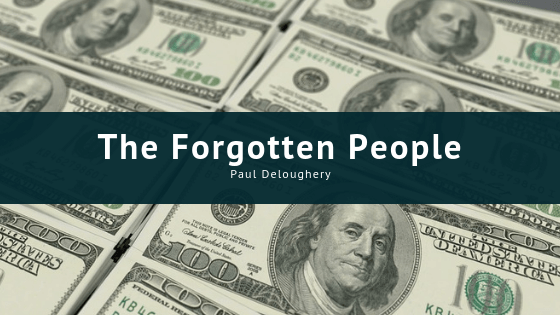
The Forgotten People
We Americans have big hearts. We have fund-raisers to combat homelessness, cancer, childhood hunger, recovering drug addicts, veterans, and the families of fallen law enforcement.
Every religious group, ethnicity, philosophy, health condition, and political group has a plethora of organizations that promote their causes. People of alternative sexual orientations have their own parades and political action committees.
But one group never gets any sympathy. Instead, they are completely looked down upon. It seems they are too lowly to warrant even a thought.
Whom am I referring to?
Recipients of sudden wealth. Everyone assumes these people don’t deserve any sympathy or concern. After all, they just got a bunch of money. And isn’t that what everyone wishes for? “If they’re too stupid to make bad decisions with that money, they have no one but themselves to blame.”
People’s views about sudden wealth are not too far off from what some people used to think about gays (“If they get AIDS and die, that’s their problem. That serves them right.”) and overweight people (“Can’t they just eat less?”). The fact is that most people “assume” they have no problems and any problems they have they brought on themselves.
The fact is that people who come into sudden money go through serious psychological and emotional struggles. Sure, it may all seem rosy at first, when there’s lots of money for trips and new toys. But the government has few laws to protect people with sudden wealth, especially if their net worth is over $1 million. (Then they are suddenly “Sophisticated Investors” and no longer need the protection of securities regulations.)
According to the Sudden Money Institute, most people who come into sudden wealth take approximately five years to get back to a state of emotional balance in which they can make rational financial decisions. Unfortunately, most people with a sudden inheritance or winning lottery ticket blow through the money much quicker than that.
It wouldn’t be so bad if it was just this simple: Someone gets a bunch of money and loses it. However, the reality is much stickier than that. Many people end up worse off financially after coming into sudden windfalls. They may have to file bankruptcy. They may end up with drug or alcohol addictions. They may be isolated, having lost contact with their family and friends who think they were “stupid” for losing a large amount of money.
With that, I have two requests for you.
First, if you know of someone who came into a large amount of money (even if it was several years ago), touch base with them. Ask how they are? Do they want to talk about anything? Is there anything they need? (You may be shocked about desperately the person wants to connect with someone who cares.
Second, if you have a large amount of money that you want to pass on to your family, please do not do it in an outright, lump sum distribution. Realize that it takes most people about five years to get to some sense of balance and rationality after they know they have inherited some money. Talk to an estate planning attorney about keeping the money in trust for your spouse and kids, and use a third party trustee (if your level of wealth warrants it).
If you have any questions, please feel free to call me. I won’t try to sell you on anything. But I genuinely care about people going through sudden wealth. I’ve been there myself, and I’ve seen plenty of others go through it. It’s not as romantic and wonderful as everyone believes.
Search
Recant Post
-
The Art of Letting Go Gracefully – Family Office Succession Planning Explained
-
Top 7 Causes of Family Conflicts and How to Resolve Them Before They Ruin Everything
-
Marriage Conflict? Here's How to Resolve Disputes Peacefully
-
Mother vs. Son? Here's How to Resolve Conflicts Peacefully
-
Don't Lose Your Loot – Smart Strategies for Protecting and Preserving Wealth
